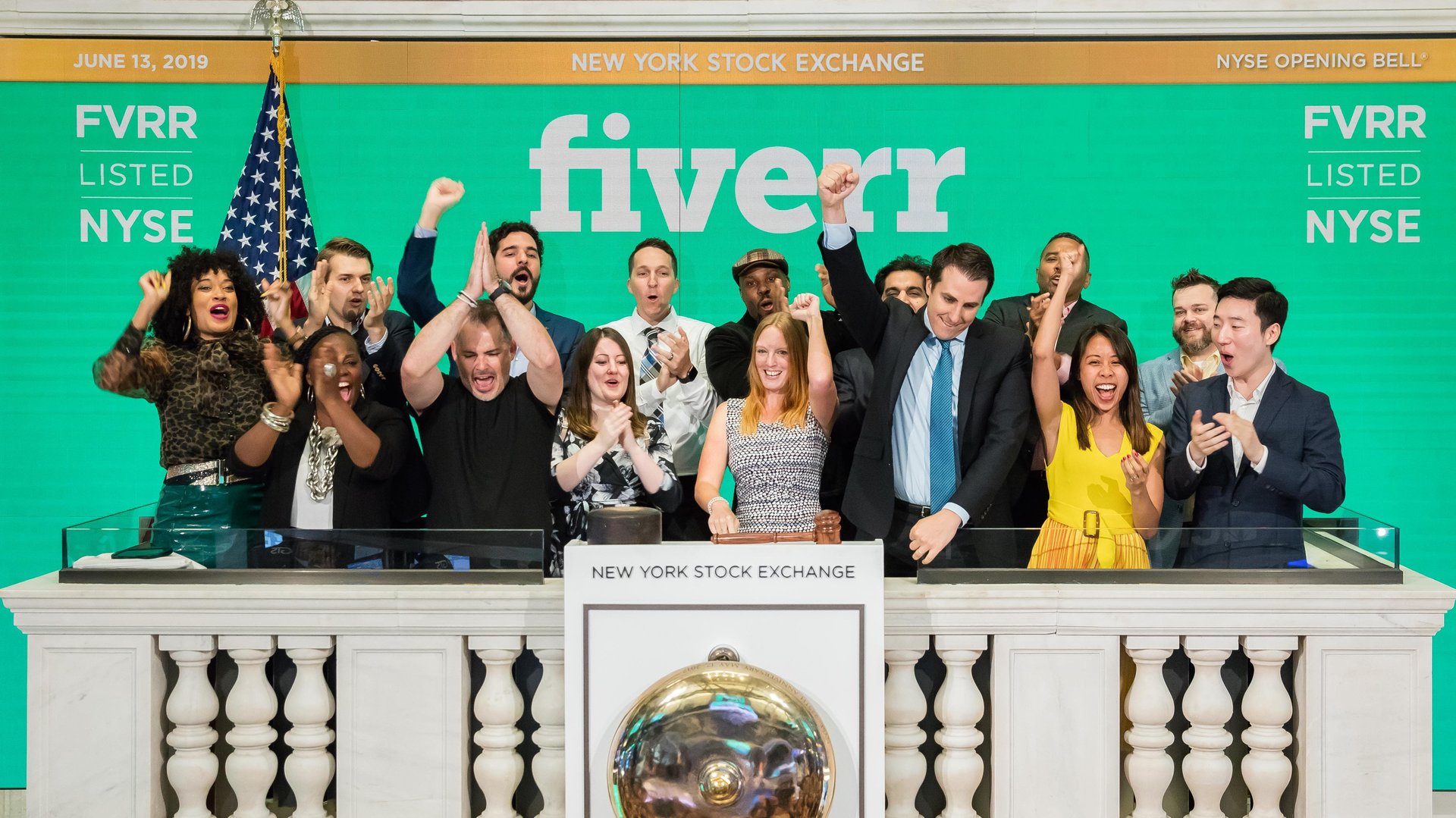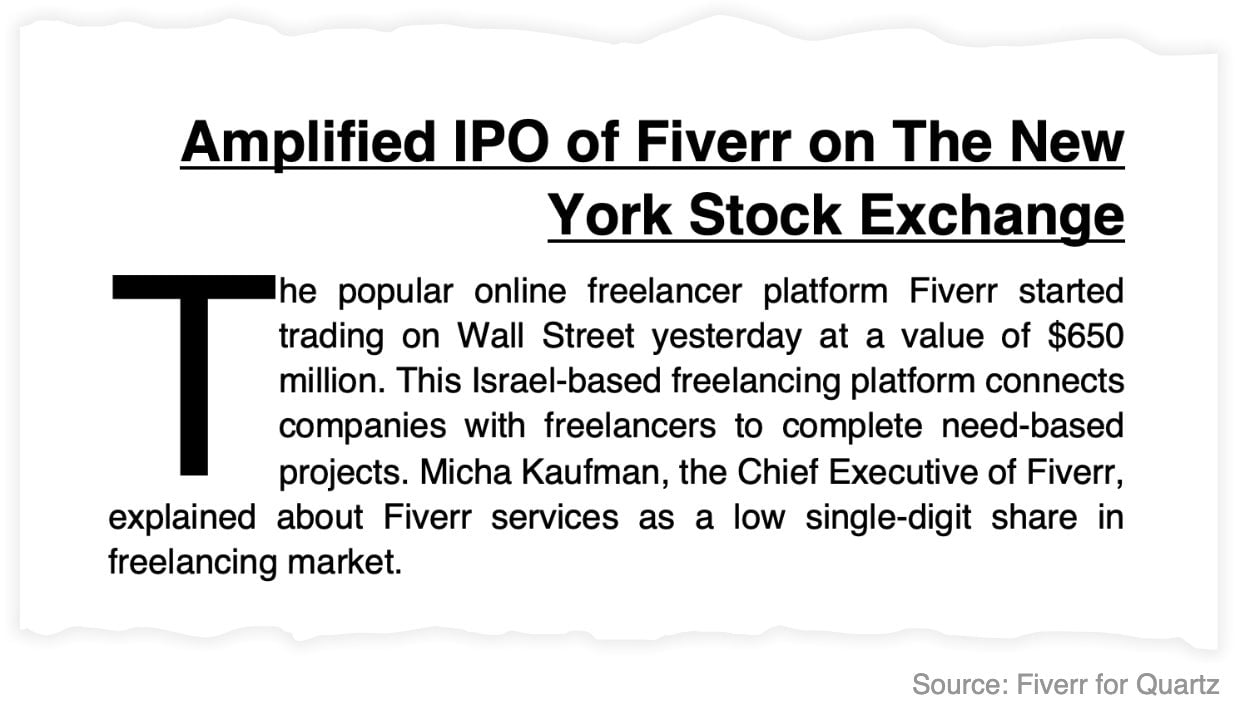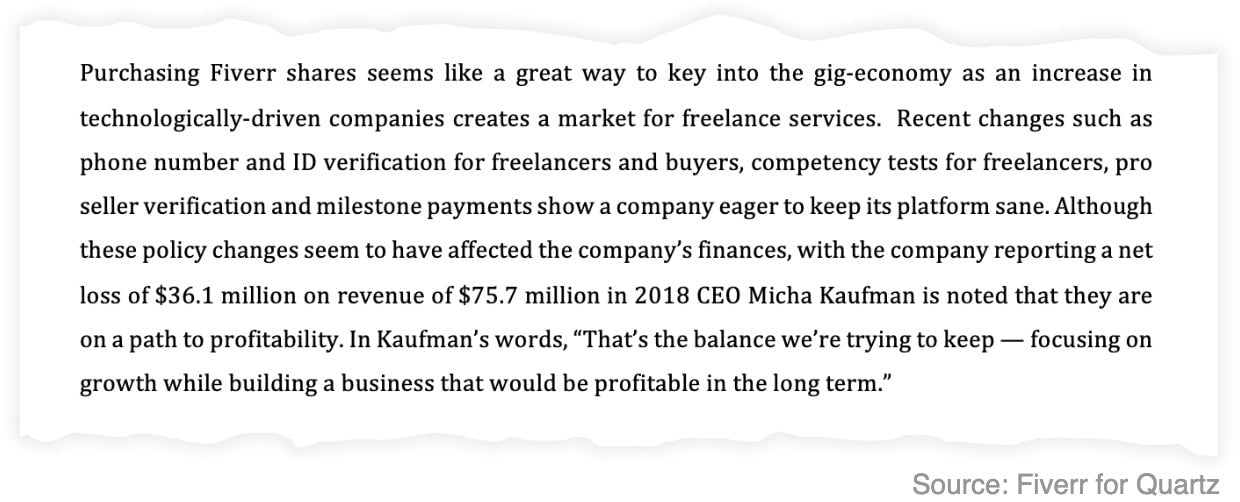We hired three Fiverr workers to write about Fiverr’s IPO
Fiverr, an Israel-based startup, is a sort of white-collar TaskRabbit—a freelance platform for services like digital marketing, ghost writing, and video editing that don’t require a physical presence. On June 13, Fiverr became the latest gig economy company to go public, following the debuts of ride-hail companies Uber and Lyft.


Fiverr, an Israel-based startup, is a sort of white-collar TaskRabbit—a freelance platform for services like digital marketing, ghost writing, and video editing that don’t require a physical presence. On June 13, Fiverr became the latest gig economy company to go public, following the debuts of ride-hail companies Uber and Lyft.
Fiverr describes itself as a “Service-as-a-Product” (SaaP) company, an unwelcome riff on the established “Software as a Service” category. The company makes money on service and transaction fees from bookings processed through its platform. Fiverr offers more than 200 types of service listings, which it calls “Gigs,” a word it has registered as a trademark. It reported a net loss of $36.1 million on $75.5 of revenue in 2018, nearly double its losses from the previous year.
But financial results can only tell you so much about a company—sometimes you just have to try it out. Which is why we decided to hire Fiverr workers to write about Fiverr’s IPO.
The request
On June 13, I posted this request on Fiverr:
Looking for a writer to produce a short news article (500 words or fewer) on Fiverr’s IPO, expected for this week. Must complete in 24-36 hours. Should be written as a traditional news story, but OK to add a bit about how your personal experience working on Fiverr informs your expectations for the IPO.
After a quick survey of various sellers offering “blog content,” I set the delivery time at 24 hours and the budget at $15. Then I published the request and waited to see who would respond. I also reached out directly to one seller who offered “SEO Articles, Blogs Or Content Writing” and looked like a good fit.
My Fiverr request elicited 29 offers, with some promising to do the task for even less than I proposed. We hired three sellers in total: a $5 seller and a $15 seller, both of whom replied to my posted request, and the seller I reached out to directly, for $10.
The $5 offer
Fiverr takes its name from the $5 asking price attached to all tasks when the company was founded in 2010 in Tel Aviv. These days many sellers charge much more, but you can still find some willing to complete a task for $5. “Hy! I can write for you. Trust me I will do best,” one of these sellers, who I’ll call Five Dollar, wrote to me. For $5, my editor and I agreed, how bad could it be?
I placed the order at 12:01pm BST on June 14. It cost $7: $5 for Five Dollar and $2 for Fiverr’s service fee. The seller’s order process asked me to send some additional details. I filled out “Fiverr’s June 13 IPO on the New York Stock Exchange” for topic/title and “fiverr, gig economy, business, technology, ipo, new york stock exchange” as keywords. Fiverr also asked for “Anything specific in your mind related to article, or any guidelines” so I wrote:
Hello! Please write a short article (250-500 words) on yesterday’s Fiverr IPO on the New York Stock Exchange. You might discuss how the stock is doing, whether Fiverr is a good investment, and how you think the company will do based on your experience working for it. Must be completed in 24 hours, thank you! This is for Quartz (qz.com).
At 2:59pm I got a message from Five Dollar: “Hi, I almost finished writing for your project. Do you want to check it before I send you the final delivery?” I failed to reply to this, and at 3:30pm Five Dollar went ahead and delivered the order. “I wrote 325 words as it was just a news so I tried to prolong it as much as I can, and you also instructed to be in a range of 250-500 words. Still if you want to add some, simply ask me. I will revise it,” the seller wrote. “Thanks again and have a great day! :)”.
This message was accompanied by six attachments: a Microsoft Word document with the requested story and five stock images that we are not including here because of their dubious origins and copyright status. The story had a bold headline and prominent drop-cap formatting. The first paragraph is below:

At first glance, Five Dollar’s work looked pretty solid, especially considering it cost $5 and was completed in about three hours. Our top concern was plagiarism so I immediately dropped the file into Grammarly’s plagiarism checker. Grammarly didn’t detect any plagiarism but said it had found one spelling mistake, three poor word choices, and one instance each of passive voice and wordy sentence structure.
Unsure about Grammarly’s assessment, I also dropped a couple lines at random into Google. This revealed that the first half of Five Dollar’s story was lifted largely from a piece written by MarketWatch, while the second half was a loose revision of a post by TechCrunch.
Grade: C+. Pros: cheap, fast service. Cons: significant plagiarism, likely copyright violations with images.
The $10 offer
While awaiting responses to my posted request, I hired the seller I had initially messaged. They assured me they were “very interested in working with you on this project” and urged me to place the order, which I did for $12—$10 for them and $2 for Fiverr—at 3pm BST on June 13. The seller, who I’ll call Tenner, promised a “well researched 500 word article” with unlimited revisions in one day. “I have all the information I need to start working on your order,” Tenner said.
By the next day, things weren’t looking so good. “Hello, can you please extend time for delivery if you don’t mind,” Tenner wrote at 8:50am. “And please explain a little bit on how to write this order. Kindly elaborate.” Tenner wanted two more days; after consulting my editor, I declined this request.
Tenner filed a second extension request, this time for 24 hours. I declined again. I felt bad. $12 for 500 words was a pittance. The gig economy can be crushingly unfair to workers. But the point was to test Fiverr’s service and we had picked this seller specifically because they promised one-day delivery. A message from Fiverr popped into the chat: “We always encourage our community members to solve any arising issues by communicating.”
At 11:39am, Tenner asked me to cancel. I accepted.

As it turns out, when you cancel a service on Fiverr, the company doesn’t issue you a refund. Instead it credits the amount to your Fiverr balance to “help you find great alternatives.”
Grade: F. Pros: none. Cons: forced cancellation, lack of actual refund.
The $15 offer
After the fiasco with Tenner, I decided spending a little more might pay off. I searched through responses to my request and paused on a $15 seller whose message sounded more human than bot.
“Hello, I have been working on Fiverr for the past 3 years and have taken a keen interest at Fiverr’s growth as a company, especially changes they’ve made to their site and operation,” this seller, who I’ll call Fifteener, wrote. “I believe they’re looking to attract premium clients, hence some changes like the ID and phone number verification which helps curb cases of false identity. I’m sure I can give you the kind of article you’re looking for and look forward to your reply.”
I hired Fifteener at 11:48am on June 14 and received a Word document the next morning. Once again, I popped the text into Grammarly’s plagiarism checker. “Significant plagiarism was detected!” Grammarly announced gleefully. It asked me to subscribe to see more details. I opened another plagiarism checker. This one declared Fifteener’s work “100% original.”
Some Googling revealed that the first two of four paragraphs Fifteener submitted had been cobbled together from stories in Yahoo Finance and Fortune. The third, however, returned few Google results and a line about changes to freelancer verification processes, similar to the one Fifteener wrote in response to my request, seemed completely original. The quote from Fiverr CEO Micha Kaufman came from the same TechCrunch article used by Five Dollar.

Grade: B. Pros: on-time delivery, original insight. Cons: modest plagiarism.
The verdict
On Fiverr, you get what you pay for. It’s easy to not pay very much. Fiverr is the kind of place where you can always find someone willing to complete a task, but the quality of the work you’ll receive is far from assured.
In its filing for a public offering, Fiverr wrote “Professionals are increasingly willing to spend money to save time.” But it took me far more time to find sellers on Fiverr, instruct them in what I wanted, wait for the delivery, and then check their work for plagiarism and other errors than it would have for me to simply write about the Fiverr IPO myself.
This is hardly surprising. It would be unreasonable to expect to be able to buy high-quality work in 24 hours for $5, a rate below the US minimum wage if the worker spent more than 40 minutes on the task. Fiverr doesn’t disclose where its workers are based—its regulatory documents note they live in more than 160 countries—but it’s obvious that many of them are based in places where the prevailing wages are much lower than in the US and Western Europe.
At the same time, 70% of Fiverr’s revenue in the past two years came from buyers in the US, UK, Canada, Australia, and New Zealand. It’s clear the company’s business depends largely on its ability to put these sellers in front of buyers where their services are priced below the market. Fiverr sells the idea that such a platform is a win for buyers and sellers—facilitated by technology!—when in reality it may not be to the liking of either party.